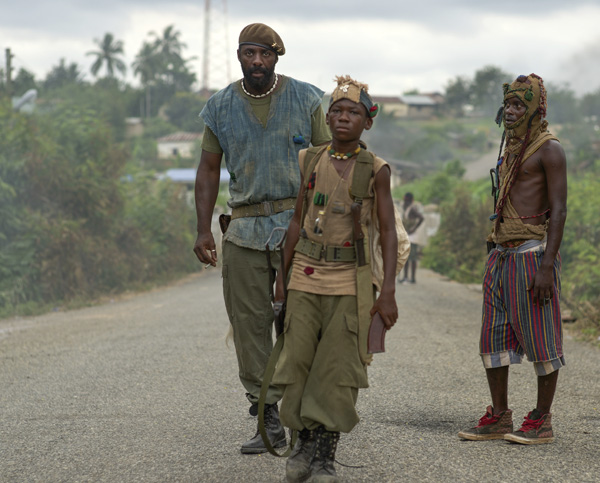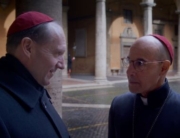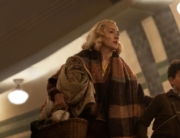There are very few actors with the charisma and sex appeal of Idris Elba, as witnessed five years ago at the Tribeca Film Festival. He made an appearance there to support his starring role in a British indie, Legacy. At the box office, filmgoers, most of them women, bought a ticket for a film whose name they didn’t know. Some couldn’t remember how to pronounce the actor’s name, referring to him as “that good-looking guy with a British accent.” Though there was no swooning or screaming at the Q&A afterward, the sexual tension in the audience was as thick as at any boy band concert. The film may not have made much of an impression, but Elba sure did.
He’s still better known for HBO’s The Wire than for any of his films. That might change, if for no other reason than that he plays against type in Beasts of No Nation, in which he stars as a rampaging small-scale dictator in charge of a ragtag rebel army in an unnamed African civil war (Beasts was filmed in Ghana). This is not an example of an actor chomping at the bit to gleefully play a baddie (see Johnny Depp in Black Mass or Tom Hardy in the upcoming Legend). Instead, his Commandant calmly exudes confidence. Because the leader exerts coercive control, Elba gives off a nothing-to-lose aura in what may be the most subdued onscreen despot in recent film. The Commandant obeys neither laws nor higher-ups and has drugged-out soldiers (mostly teens and boys) as his protectors. Take Forest Whitaker’s Idi Amin bravado in The Last King of Scotland and divide by two.
This aligns with writer/director Cary Joji Fukunaga’s big picture approach to adapting Nigerian American Uzodinma Iweala’s 2005 novel. As a result, the film lacks an anchor. All the characters are overwhelmed by the larger events and turn into bit players in a country that has collapsed into chaos. Not that they are stick figures exactly, but they are all at the mercy of larger forces on the ground and of the storyline. So it’s easy for the audience to get caught up in the incessant chaos and thus lose sight of the main protagonist, Agu, a skinny boy–turned–child soldier and a stand-in for a generation lost to war.
That’s mainly due to how Fukunaga has directed teen actor Abraham Attah, who is making his acting debut. Agu observers and obeys; he has no choice. He’s captured by the Commandant’s forces after fleeing into the forest, and he has to prove his loyalty to the rebels, or else he will be executed. Yet it’s a very still, restrained performance, considering the numerous times Agu dodges bullets or wields a machete. Granted, the film’s first 20 minutes have a refreshing lightheartedness, with Agu at play with his mates and his older brother, before the war comes crashing down on his village: the army comes looking for rebel sympathizers and neighbor turns on neighbor.
Years ago, actress Julianne Moore, when promoting Far From Heaven, commented on the burden placed on juvenile actors; they are only kids, yet they are saddled with the responsibility of the success of a film. That’s the case here, yet the young actor comes across as detached from his surroundings. It’s a viewing experience that audiences absorb but don’t feel deeply; the threat of child endangerment generates what passes for empathy.
Instead of placing viewers into his worn-out shoes, the film relies on Aga’s pedestrian initiation into a killing machine as a way to draw in the audience, but the rapes (off screen), mutilations, and explosions come off as plot points. Speaking of bloodshed, the portrayal of the mayhem is somewhat tame, considering the material, especially in this intense age of Sicario or 12 Years a Slave. Eventually Beasts turns into a pat, and brutal, odyssey, less an examination than an overview, with an ending that’s strangely tension free. In lieu of an emotional pull coming from central character, the film uses violence as the main gateway into this world.
Part of the reason for the muted impact may be due to another similarly themed film stealing its thunder, Kim Nyugen’s surreal and somber War Witch, Canada’s Oscar 2013 nominee for best foreign language film. That original screenplay layered in multiple issues into a harrowing, on-the-warfront point of view. It raises the stakes considerably for its child soldier, a 14-year-old teenage girl, who, among the many atrocities she participates in, is forced to shoot her parents. Under a tighter running time of 90 minutes, it also conveys more variation in tone. There’s extreme violence, too, but also more character development.







Leave A Comment